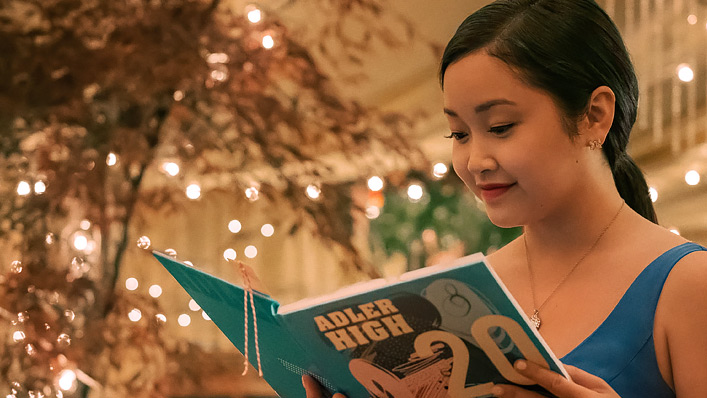To All the Boys: Always and Forever wraps up the series with pure rom-com escapism

A sunny visual palette shines and greeting card-style life lessons are learned in the final installment of Netflix‘s To All the Boys series. Here’s critic Sarah Ward’s review.
The “find someone who looks at you” meme may pre-date Netflix’s To All the Boys franchise, but it couldn’t encapsulate this teen rom-com trilogy better. Starting with 2018’s To All the Boys I’ve Loved Before, continuing with 2020’s To All the Boys: PS I Still Love You and now finishing with To All the Boys: Always and Forever, the series doesn’t simply bake that longing, loving sentiment into its frames — it also wears the fanciful idea that life should be filled with swooning and mooning as a badge of honour.
See also:
* The 10 best Netflix Original Movies from 2020
* All new movies & series on Netflix Australia
* All new streaming movies & series
The saga’s story began with love letters, after all. Lara Jean Song Covey (Lana Condor) penned them to her crushes, detailing her feelings in florid detail, but didn’t send them. Then, in a stroke of rom-com convenience, her younger sister Kitty (Anna Cathcart) mailed out the stash of correspondence, causing Lara Jean more than a little embarrassment. In another of the genre’s twists of fate, it also saw her coupled up with jock dreamboat Peter Kavinsky (Noah Centino) after he received one of her passionate missives. Initially, their relationship was all for show; however, as yearning looks began to colour their fake dates, their staged romance inevitably turned real.

So far, so sweet. Trading in big feelings, grand gestures and rom-com tropes is this franchise’s remit, and it commits. Accordingly, after PS I Still Love You tested Lara Jean and Peter with a love triangle, Always and Forever has them struggle with their future. Like every blissful high-school couple in an American movie, this pair has everything planned out. They’ll attend the same college, farewell curfews and parental rules, and keep forging intertwined lives. Alas, Stanford has other ideas. While Peter has already been accepted on a lacrosse scholarship, the studious Lara Jean gets knocked back. She adjusts, setting her sights on the nearby Berkeley instead, only to fall in love with NYU almost 5000 kilometres away.
When Netflix started releasing romantic comedies in a big way, its executives couldn’t have predicted that escapism-via-streaming would become everyone’s main pastime in 2020 and 2021. Trusting the algorithm, the platform’s powers-that-be simply knew that their audience loved rom-coms. They also bet that pumping out formulaic flicks would keep subscribers happy. It seemingly has; but the To All the Boys movies package their template smartly, falling back on a tried-and-tested tactic that works a treat here. These aren’t just films about lovelorn teens, but odes to the genre that’s made such characters a cinematic staple.
Much of Always and Forever’s charms stem from its rom-com literacy. It knows its John Hughes flicks from its Nora Ephron fare; it’s not afraid to name-check titles and recreate famed scenes; and it owns every nod and wink. In fact, as adapted from Jenny Han’s 2017 novel by director/cinematographer Michael Fimognari and screenwriter Katie Lovejoy, it stares at the romantic comedy genre in the same adoring way that Lara Jean and Peter stare at each other.
It’s one thing to string together a checklist of rom-com clichés and think that cinematic sparks will instantly fly, as too many average and awful movies have previously. It’s another to knowingly work through the usual elements—here, that means overseas holidays, cross-country school trips, the prom, a backyard wedding and both breaking and making up—while beaming with genuine affection for the genre and the escapism at its core. Including Lara Jean’s Instagram-friendly bedroom and the banter-heavy dialogue, little about Always and Forever resembles reality, but that isn’t this franchise’s niche. Although it draws upon relatable emotions and coming-of-age experiences, it gleefully wraps them up in rom-com fantasy.
Always and Forever doesn’t pretend otherwise, either, because self-awareness is one of this series’ strengths. Indeed, by embracing romantic comedy escapism so heartily, the saga has also been able to adapt and update the genre where necessary, as seen in its never-exoticised treatment of Laura Jean’s Korean heritage.
No one will start their To All the Boys journey with Always and Forever. Everyone will end it here, though, and get exactly what they expect in the process. Condor and Centino are charismatic, a sunny visual palette shines across the screen, greeting card-style life lessons are learned, and everything proves neat even when it’s supposed to be messy. And, rom-com cinema gets a box-ticking new entry-cum-tribute that eagerly goes weak at the knees for the genre’s fantasies.

















